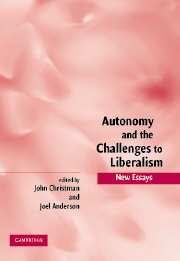Book contents
- Frontmatter
- Contents
- Contributors
- Preface
- Autonomy and the Challenges to Liberalism
- 1 Introduction
- PART I THE SELF: CONCEPTIONS OF THE AUTONOMOUS SELF
- 2 Decentralizing Autonomy: Five Faces of Selfhood
- 3 The Self as Narrator
- 4 Autonomy and Self-Identity
- PART II THE INTERPERSONAL: PERSONAL AUTHORITY AND INTERPERSONAL RECOGNITION
- PART III THE SOCIAL: PUBLIC POLICY AND LIBERAL PRINCIPLES
- PART IV THE POLITICAL: LIBERALISM, LEGITIMACY, AND PUBLIC REASON
- Bibliography
- Index
2 - Decentralizing Autonomy: Five Faces of Selfhood
Published online by Cambridge University Press: 02 December 2009
- Frontmatter
- Contents
- Contributors
- Preface
- Autonomy and the Challenges to Liberalism
- 1 Introduction
- PART I THE SELF: CONCEPTIONS OF THE AUTONOMOUS SELF
- 2 Decentralizing Autonomy: Five Faces of Selfhood
- 3 The Self as Narrator
- 4 Autonomy and Self-Identity
- PART II THE INTERPERSONAL: PERSONAL AUTHORITY AND INTERPERSONAL RECOGNITION
- PART III THE SOCIAL: PUBLIC POLICY AND LIBERAL PRINCIPLES
- PART IV THE POLITICAL: LIBERALISM, LEGITIMACY, AND PUBLIC REASON
- Bibliography
- Index
Summary
People are cast into highly variable and unpredictable circumstances. Sometimes they face appalling situations. Sometimes they face predicaments of mind-boggling complexity or paralyzing opacity. Even the most familiar, seemingly routine situations are nuanced in unforeseen ways, and ignoring these subtleties can only lead to missteps, misunderstandings, or worse. I take it that an account of autonomy should capture the agentic resourcefulness people need to cope with life's vicissitudes, ordeals, and upheavals. To do this, an account of autonomy must explain how one can encounter unexpected constraints, discern novel opportunities, and improvise on the spot without parting company from one's authentic traits, affects, values, and desires. More specifically, a tenable account of self-discovery and self-definition must be premised on a view of authenticity that countenances sufficient adaptability to make sense of these agentic capacities. In this chapter, I seek to extend the range of autonomous agency while preserving a rich enough view of autonomous reflection and choice to draw the vital distinction between enacting authentic attributes and enacting inauthentic ones.
There are all sorts of good reasons to classify conduct as nonautonomous, but I suspect that philosophers misclassify some conduct because it stems from agentic capacities that have wrongly fallen into disrepute among autonomy theorists. Autonomy theorists for whom Kant's moral philosophy is the locus classicus tend to gravitate to a mentalistic, individualistic conception of the autonomous subject and to a rationalistic account of autonomous deliberation and volition.
- Type
- Chapter
- Information
- Autonomy and the Challenges to LiberalismNew Essays, pp. 27 - 55Publisher: Cambridge University PressPrint publication year: 2005
- 37
- Cited by



